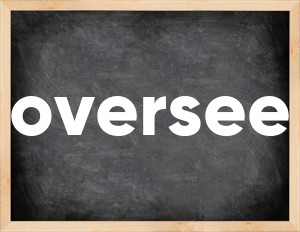 The English verb 'oversee' is pronounced as [ˌəʊvəˈsiː].
The English verb 'oversee' is pronounced as [ˌəʊvəˈsiː].
Related to:
irregular verbs.
3 forms of verb oversee: Infinitive (oversee), Past Simple - (oversaw), Past Participle - (overseen).
Here are the past tense forms of the verb oversee
👉 Forms of verb oversee in future and past simple and past participle.
❓ What is the past tense of oversee.
Oversee: Past, Present, and Participle Forms
| Base Form | Past Simple | Past Participle |
|---|---|---|
| oversee [ˌəʊvəˈsiː] |
oversaw [ˌəʊvəˈsɔː] |
overseen [ˌəʊvəˈsiːn] |
What are the 2nd and 3rd forms of the verb oversee?
🎓 What are the past simple, future simple, present perfect, past perfect, and future perfect forms of the base form (infinitive) 'oversee'?
Learn the three forms of the English verb 'oversee'
- the first form (V1) is 'oversee' used in present simple and future simple tenses.
- the second form (V2) is 'oversaw' used in past simple tense.
- the third form (V3) is 'overseen' used in present perfect and past perfect tenses.
What are the past tense and past participle of oversee?
The past tense and past participle of oversee are: oversee in past simple is oversaw, and past participle is overseen.
What is the past tense of oversee?
The past tense of the verb "oversee" is "oversaw", and the past participle is "overseen".
Verb Tenses
Past simple — oversee in past simple oversaw
(V2).
Future simple — oversee in future simple is oversee (will + V1).
Present Perfect — oversee in present perfect tense is
overseen
(have/has + V3).
Past Perfect — oversee in past perfect tense is
overseen
(had + V3).
oversee regular or irregular verb?
👉 Is 'oversee' a regular or irregular verb? The verb 'oversee' is irregular verb.
Examples of Verb oversee in Sentences